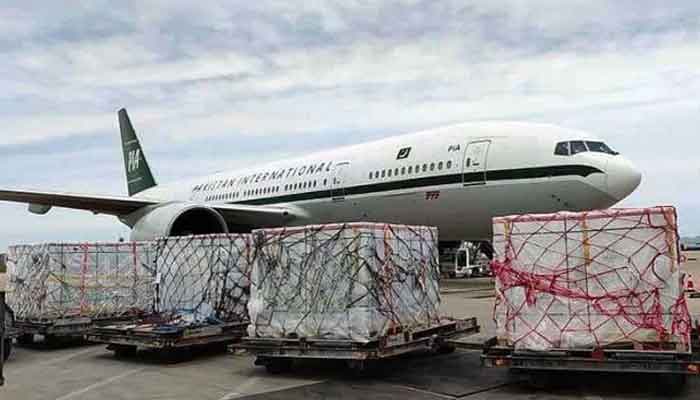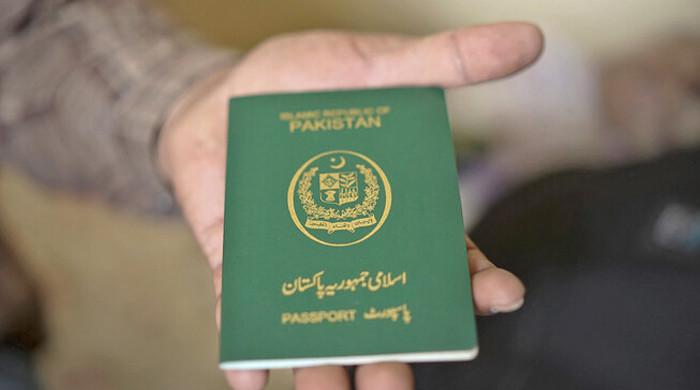2 million doses of Sinovac vaccine brought to Pakistan via special PIA flight
Around three million more COVID-19 vaccine doses will be transported to Pakistan in the next 10 days, officials say
June 22, 2021

- Two million doses of Sinovac vaccine arrive today.
- On Sunday, 1.55 million doses had arrived.
- A further three million doses of vaccines are expected in the next 10 days.
BEIJING: A special flight of Pakistan International Airlines (PIA) PK-6852 airlifted two million doses of Sinovac COVID-19 vaccine from the Beijing Capital International Airport to Islamabad on Tuesday.
This special flight of the national flag carrier is in addition to the special flight PK-6852 which transported 1.55 million doses of the Sinovac vaccine from China to Pakistan on Sunday, Qadir Bux Sangi, PIA Country Manager for China told APP.
According to official sources, around three million more doses of COVID-19 will be transported to Pakistan in the next 10 days.
The government aims at inoculating 70 million people by year's end.
As many as 2.3 million people in Pakistan got vaccinated against COVID during the last week (June 12-18) and the total number of fully vaccinated individuals stands at 3,457,578.
It may be mentioned that Pakistani health authorities had launched a nationwide vaccination drive with around a million doses of Sinopharm vaccine donated by China, starting with older people and frontline healthcare workers, in March.
Islamabad received the first COVID-19 vaccine consignment after a military aircraft transported it from Beijing on February 1, this year.
The drive began with a focus on the oldest people in the community, generally over the age of 80 and worked its way down.
Initially, the government had to deal with vaccination hesitancy and a shortage of vaccine supplies and had limited shots for people aged 30 or over.
Now vaccines are available for people aged over 18 years.
Gap between shots for Chinese vaccines increased
The National Command and Operation Centre (NCOC) has revised the guidelines for two-dose Chinese vaccines, increasing the gap between the doses to six weeks.
The two-dose SinoVac and Sinopharm vaccines were initially administered with a four-week gap which has now been increased to six weeks.
Pakistan revises guidelines for two-dose Chinese vaccines
The Sindh government has said that those citizens who had already received one dose of Sinopharm, will still get their second dose after the earlier set 21-day gap. Similarly, those having received one dose of Sinovac, will get their second dose after four weeks, as was the earlier practice.
The provincial health department said that the new rule, of a six-week gap, applies to those who will get inoculated for the first time today onwards.
Vaccination drive hits a snag due to shortages
The arrival of vaccines this week are a welcome sign after vaccine shortages were reported in Punjab and Sindh at the turn of the weekend.
In Lahore, only four out of 23 vaccination centres were said on Friday to be administering vaccines, according to sources in the Punjab Health Department.
The sources said prior to the shortage, 60,000-50,000 people were being inoculated daily, while on June 16, 35,625 jabs were administered, and on June 17, 23,425 people were inoculated.
Meanwhile, vaccine stocks have completely dried up in Bahawalnagar, while the stock in Gujranwala was expected to finish on Friday.
Pressure on coronavirus vaccine supplies to ease next week: Dr Faisal Sultan
In Karachi, the situation is just as worrying, as 90 COVID-19 vaccination centres were reported at the time to have almost run out of vaccines, according to sources in the Sindh Health Department.
The sources said small vaccination centres in districts Korangi, Central, South, East, and West are all facing shortages.
In Sindh overall, 40% of the vaccination centres have halted the inoculation process due to a shortage, sources said.












